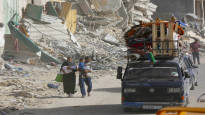On Monday, Israel launched a ground offensive in Rafah, where 1.5 million Palestinians had sought refuge.
At the same time that the Eurovision party started in Sweden’s Malmö at the beginning of the week, Israel launched a ground attack on Rafah in Southern Gaza, where about 1.5 million Palestinians have packed up.
Israel justifies the attack by saying that a significant number of Hamas fighters are hiding in Rafah. Israel calls its current operation “limited”, but several non-governmental organizations warn of a humanitarian crisis.
President of the United States Joe Biden threatened on Thursday that the United States would stop supplying Israel with bombs and artillery shells if it carried out a large-scale ground attack on Rafah. So far, according to Biden, Israel has not crossed the red line.
In this story, we tell you the latest information about the situation in Gaza.
No place is safe anymore
During the seven-month war, Israel has advanced from northern Gaza towards the south, destroying Gaza cities. For months, Rafah has been the only place spared from the Israeli ground operation.
Although Rafah has also received its share of Israeli airstrikes in the past, a large part of Gaza’s residents have sought refuge there. According to the UN children’s organization Unicef, about 600,000 of the people in the area are children.
The map graphic below shows how many refugees have arrived in Rafah:
On Monday, the IDF ordered people to leave the eastern part of Rafah closer to the Mediterranean coast with leaflets dropped from planes.
By Saturday, around 300,000 people had already fled Rafah.
According to the UN, there are already about half a million people in the new “humanitarian area” defined by Israel.
There is a shortage of clean water, and dehydration is an acute problem for Gazans – daytime temperatures in the area rise up to 38 degrees Celsius. There is sewage and waste in the country. There are not enough tents or medical stations.
Famine is now spreading south
According to the World Food Program (WFP), there is a full-blown famine in northern Gaza. The region has suffered the worst of all from Israeli aerial bombardment and artillery strikes, and the IDF has also prevented humanitarian aid from reaching there.
Now the famine is spreading towards the south.
Most of the humanitarian aid delivered to Gaza has passed through Rafah, but this week Israel closed the Rafah and Kerem Shalom border crossings that lead there.
Israel says it opened Kerem Shalom again on Wednesdaybut according to the UN, applying for humanitarian aid at the border is practically impossible due to the fighting.
A surgeon who volunteered in Rafah until Monday Nick Maynard tells news agency for AP, that Rafah suffered from hunger even before the Israeli ground offensive began. Two teenage girls with treatable injuries died last week of complications from starvation, he said.
Hospitals have to close their doors
The start of the Israeli ground operation also meant an immediate healthcare crisis in Rafah.
The region’s largest hospital, al-Najjar, closed its doors and staff and patients fled amid chaotic conditions on Tuesday.
Smaller clinics also had to suspend their operations. Israeli tanks have also cut off communication with the European hospital in Khan Yunis.
Since the only border crossing points are not in use, more medical supplies and fuel cannot be delivered to Rafah, and patients in critical condition cannot be evacuated from there to the Egyptian side.
Now in Rafah, only the small al-Kuwaiti hospital, which is full to the brim, accepts patients.
Hospital manager Suhaib al-Hams tells For The Washington Post, that the staff is in no way capable of treating the flood of seriously wounded patients. There are not enough doctors and space to treat brain injuries and burns or to amputate limbs.
In addition, residents of Gaza are plagued by motion sickness. According to Unicef, almost all children under the age of 5 suffer from one or more communicable diseases.
More than a million Palestinians have been living packed into a small area of land for more than half a year. A large number of them have lived in dirty tent conditions.
European hospital doctor Mohammad Abdelfattah tells The Washington Post that the hospital doesn’t even have soap or disinfectant. Flies fly in operating theatres.
During the war that broke out in October, Israeli forces have killed nearly 35,000 people in Gaza, according to the Ministry of Health under Hamas. Most of them are women and children.
Sources: The Washington Post, BBC, AP, Reuters
